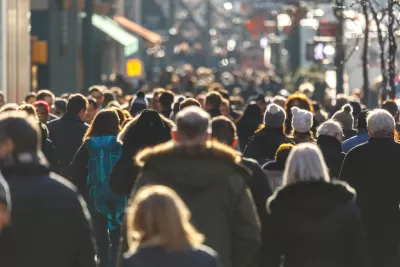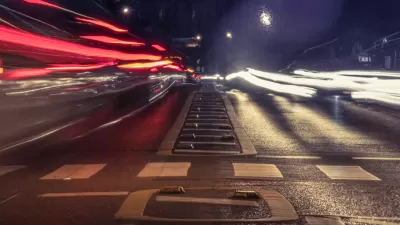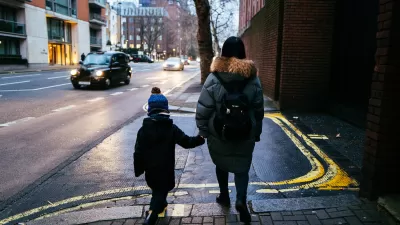A new report by Victoria Walks, an advocacy organization in Australia, quantifies the benefits of choosing to walk. The report also benefits the multiplier of the choice to invest in pedestrian infrastructure.

"If you walk for 20 minutes to and from work, the state economy benefits $8.48," according to an article by Timna Jacks.
That's the finding of a new report commissioned by Victoria Walks and completed by Arup—so the figures are specific to the state of Victoria in Australia. According to "The Economic Case for Investment in Walking" [pdf], the cost savings "comes from reducing costs to the health system, removing the cost to run a car or public transport and improvement to local traffic and the environment."
The report also quantifies the benefits of investing in pedestrian infrastructure. "For every $1 spent on walking, Victoria would stand to gain $13, according to the report using modelling by engineering firm Arup." Despite those figures, the state has budgeted only $7 billion for pedestrian programs and projects by 2020. That's down from $9 billion in 2017.
FULL STORY: 'Learning bad habits': The $8 benefit of your morning walk

Planetizen Federal Action Tracker
A weekly monitor of how Trump’s orders and actions are impacting planners and planning in America.

Congressman Proposes Bill to Rename DC Metro “Trump Train”
The Make Autorail Great Again Act would withhold federal funding to the system until the Washington Metropolitan Area Transit Authority (WMATA), rebrands as the Washington Metropolitan Authority for Greater Access (WMAGA).

The Simple Legislative Tool Transforming Vacant Downtowns
In California, Michigan and Georgia, an easy win is bringing dollars — and delight — back to city centers.

The States Losing Rural Delivery Rooms at an Alarming Pace
In some states, as few as 9% of rural hospitals still deliver babies. As a result, rising pre-term births, no adequate pre-term care and harrowing close calls are a growing reality.

The Small South Asian Republic Going all in on EVs
Thanks to one simple policy change less than five years ago, 65% of new cars in this Himalayan country are now electric.

DC Backpedals on Bike Lane Protection, Swaps Barriers for Paint
Citing aesthetic concerns, the city is removing the concrete barriers and flexposts that once separated Arizona Avenue cyclists from motor vehicles.
Urban Design for Planners 1: Software Tools
This six-course series explores essential urban design concepts using open source software and equips planners with the tools they need to participate fully in the urban design process.
Planning for Universal Design
Learn the tools for implementing Universal Design in planning regulations.
Smith Gee Studio
City of Charlotte
City of Camden Redevelopment Agency
City of Astoria
Transportation Research & Education Center (TREC) at Portland State University
US High Speed Rail Association
City of Camden Redevelopment Agency
Municipality of Princeton (NJ)





























